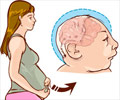The use of NSAID by women in their first trimester could be associated with cardiac abnormalities in babies.
The use of NSAID by women in their first trimester could be associated with cardiac abnormalities in babies.
Non-steroidal anti-inflammatory drugs, NSAIDs, Cardiac septal defects, Journal Birth Defects Research Part B, Trimester, Pregnancy, Case control, Congenital abnormality, DiabetesWomen who take non-steroidal anti-inflammatory drugs (NSAIDs) early in their pregnancies may be more likely to give birth to babies with congenital defects.
The findings of a new case controlled study has been published in the August issue of the journal Birth Defects Research Part B, which is published by John Wiley & Sons, states that congenital birth defects especially cardiac septal defects, could be associated with the use of NSAID by women in their first trimester. It was reported that article is also available online via Wiley Interscience www.interscience.wiley.com/
journal/bdrb.
Many pregnant women get prescriptions for NSAIDs during their first trimester, and even more--up to 15 percent--take over-the-counter versions of these drugs. Previous studies have shown that taking NSAIDs toward the end of a pregnancy can cause certain circulatory problems--premature closure of the ductus arteriosus and patent ductus arteriosus, but the risks related to early-pregnancy ingestion are less well defined.
To better understand the relationship between first trimester use of NSAIDs and congenital birth defects, researchers led by Anick Berard, Ph.D. of St. Justine Hospital in Montreal, conducted a population-based case-control study. They gathered information from three administrative databases in Quebec and included 36,387 pregnant women in their study. They determined which women had filled prescriptions for NSAIDs during their first trimester and which had babies diagnosed with a congenital abnormality in the first year of life. Based on information from previous studies, the primary outcome of interest was cardiac septal closure and related abnormalities.
For each infant diagnosed with a congenital abnormality, the researchers matched up to ten controls by date of conception and maternal age, region of residence, and diabetes status. They performed statistical analyses to uncover any associations between the congenital abnormalities and the mother's use of NSAIDs during the first trimester.
Advertisement
"Our analysis of data from the Medication and Pregnancy registry suggests that women who fill prescriptions for NSAIDs in the first trimester of pregnancy may be at greater risk of having children with congenital anomalies, particularly those related to cardiac septal closure," the authors conclude. "This is in accordance with previous findings, but needs to be replicated in other study populations."
Advertisement











